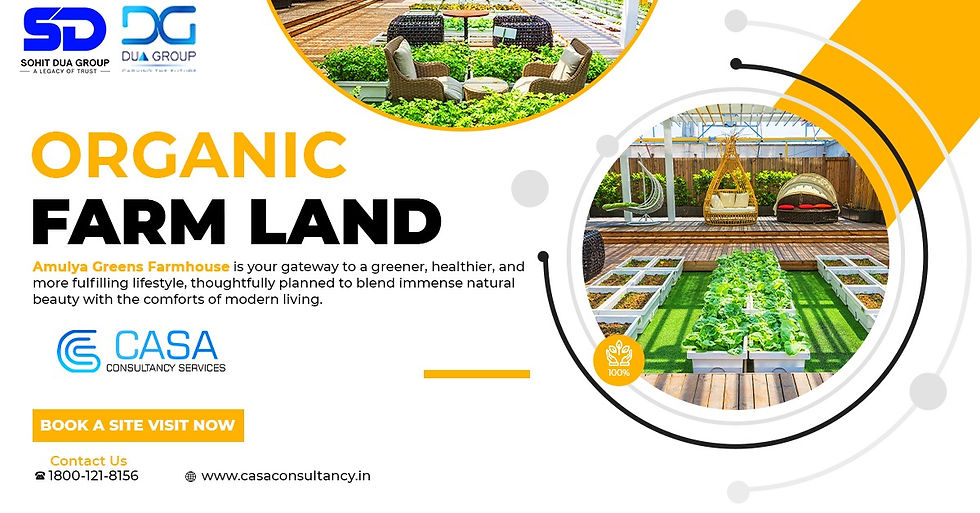Organic Farm Land For Sale
- Casa Consultancy Services
- Aug 18, 2025
- 3 min read
Updated: Dec 19, 2025
We are the top real estate brokers in south delhi. In an age where environmental consciousness and a desire for healthier lifestyles are paramount, the concept of organic farming has moved from a niche practice to a global movement. At the heart of this revolution lies organic farm land—a living, breathing ecosystem that is fundamentally different from its conventional counterpart. This article delves into the world of organic farm land, exploring its unique characteristics, the benefits it offers, the challenges of acquiring and managing it, and its growing importance in a sustainable future.

The defining feature of organic farm land is its adherence to a set of strict, internationally recognized standards. Unlike traditional farming, which often relies on synthetic fertilizers, pesticides, and genetically modified organisms (GMOs), organic agriculture promotes a holistic approach. It is a system that works in harmony with nature, prioritizing biodiversity, biological cycles, and soil health.
This means the soil on organic farm land is built and maintained naturally, through practices like composting, cover cropping, and crop rotation. These methods enrich the soil with organic matter, improving its structure, water retention, and nutrient content, all without the use of harmful chemicals.
The benefits of cultivating organic farm land are far-reaching, extending beyond the farm gate to consumers, the environment, and the broader economy. For the planet, it’s a powerful tool in the fight against climate change. Healthy organic soils store more carbon, helping to sequester greenhouse gases from the atmosphere.
The absence of synthetic chemicals also means less water and air pollution, protecting delicate ecosystems and water sources. Biodiversity thrives on organic farm land, as farmers encourage the presence of beneficial insects, birds, and other wildlife that act as natural pest controllers. This creates a resilient, balanced ecosystem that is less susceptible to disease and pest outbreaks.
For the consumer, the appeal of produce from organic farm land is rooted in health and safety. Organic products are free from synthetic pesticide residues and are often perceived as being more nutritious. The transparent and regulated nature of the organic certification process provides consumers with confidence in the integrity and origin of their food. This trust is a significant driver of the rapidly growing global market for organic goods, which reached nearly $136.4 billion in 2023.
The journey to establishing organic farm land, however, is not without its challenges. The conversion process is a multi-year commitment, typically requiring a three-year period without the use of prohibited substances before the land and its crops can be certified organic. This transition period can be a financial hurdle for farmers, as yields may be lower while input costs remain high. The labor-intensive nature of organic farming, which relies on manual or mechanical weeding instead of herbicides, also contributes to higher operational costs. Furthermore, managing pests and diseases without synthetic chemicals requires a deep understanding of natural biological controls and integrated pest management (IPM) strategies.
Despite these obstacles, the economic viability of organic farm land is increasingly evident. While yields may be lower per acre compared to conventional farming, the premium prices that organic produce commands in the market often lead to higher overall returns for the farmer. Case studies from around the world have demonstrated that even small-scale organic farms can achieve significant profitability.
For example, some farmers are able to earn a substantial income by diversifying their operations, selling high-value crops, and even venturing into products like organic ghee or compost. The demand for organic farm land is a clear indicator of this trend, with a noticeable increase in the area being managed organically across the globe.
Governments and international organizations are recognizing the immense potential of organic farm land and are providing various forms of support, including subsidies and grants, to encourage farmers to make the transition. This support, coupled with the rising consumer demand for clean and sustainable food, is creating a positive feedback loop that is driving the expansion of organic agriculture. The global organic farming area increased by 2.5 million hectares in 2023, reaching almost 99 million hectares, with Latin America and Africa showing particularly dynamic growth.
The future of agriculture is inextricably linked to the health of our planet and the well-being of its inhabitants. In this context, organic farm land is not just a piece of property; it is a philosophy, a commitment, and an investment in a more sustainable future. It represents a return to fundamental principles of ecological balance and stewardship, demonstrating that it is possible to produce abundant, healthy food while simultaneously regenerating the environment.
As more people seek out food that is good for them and good for the earth, the value and importance of organic farm land will only continue to grow. It is a tangible asset and a moral imperative, a foundation for a food system that is truly regenerative and resilient. The cultivation of organic farm land is a testament to the idea that profitability and sustainability can, and should, go hand in hand.

Comments